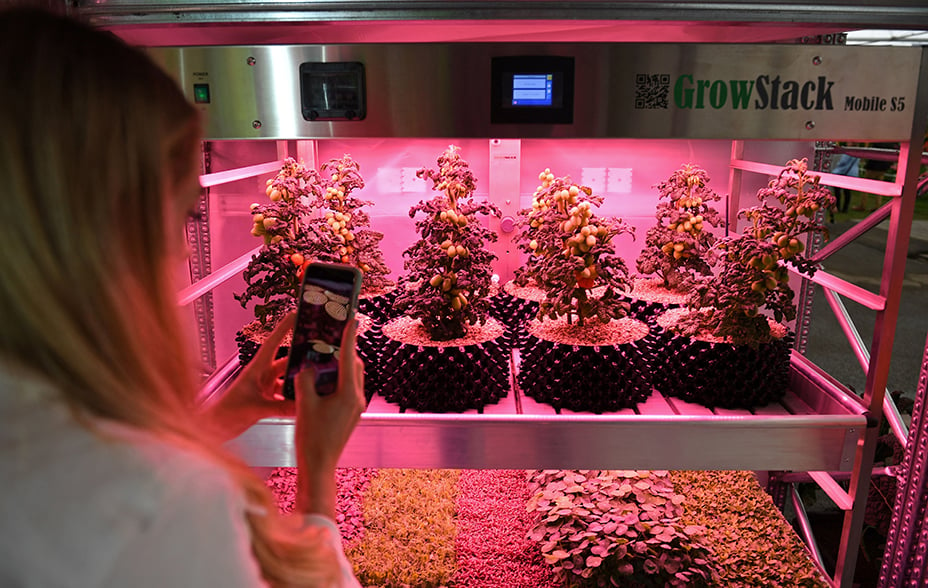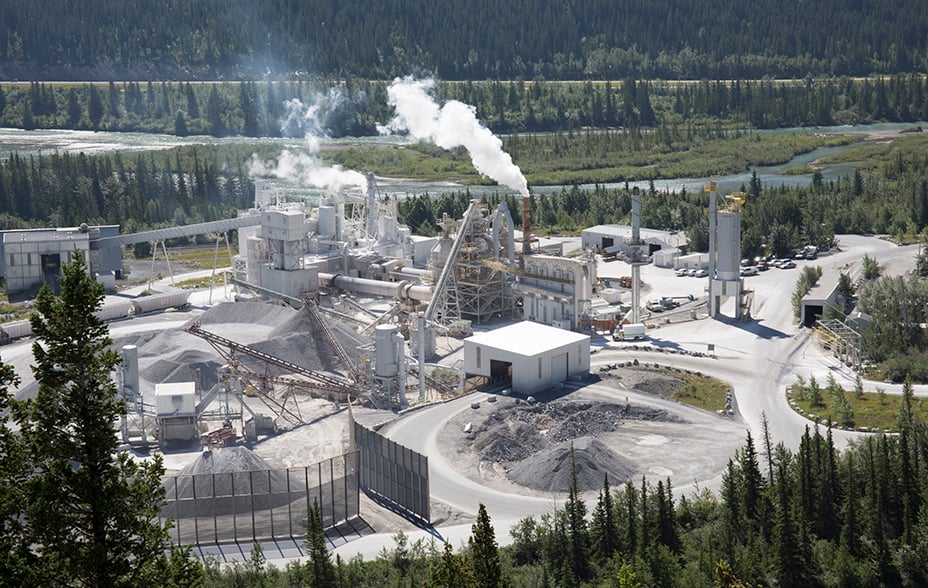Key points
Weighing up a company’s efforts to find new ways to cut carbon or to make supply chains more transparent is a more thoughtful approach than paying heed to crude risk metrics.

The value of an investment, and any income from it, can fall as well as rise and investors may not get back the amount invested.
Every three years, Baillie Gifford hosts its client conference in Gleneagles, where we share thoughts about our investment philosophy, the growth companies in the portfolio and the key concepts and themes that we believe will generate positive returns over the long term.
This year, two members of the International Alpha team, Tara-Jane Fraser and Tom Walsh, co-hosted a conference session focused on Baillie Gifford’s approach to environment, social and governance (ESG) and the influence these factors might have on investment returns over the next decade.
We take this seriously at International Alpha. Our senior ESG analyst, Tara-Jane Fraser, has been working with us since 2017. She recently joined the International Alpha central desk on a full-time basis to support the increasing emphasis we place on sustainability within our long-term investment analysis.
Tara and Tom were joined at Gleneagles by Dr Eve Hepburn from Baillie Gifford’s Investment Risk, Analytics and Research team.
Eve’s background in comparative politics and society helps to advance our thinking about how investing might generate positive societal and environmental returns in the future, alongside financial ones.
We’ve included a summary of what our three speakers discussed below:
Eve Hepburn: A walk through the future
The year is 2031.
You and your family have spent the last decade navigating the twists and turns of a rapidly changing world. But rest assured, you’re still doing the things you’ve always loved.
You still travel on holiday to beautiful foreign lands and soak up the local culture. Except these days the aeroplanes you fly on increasingly use biofuels or electricity. And you probably focus more on the quality of your trips rather than quantity, thereby reducing your carbon footprint.
Your home still provides warmth in the winter and a cool space to relax in the summer. That’s handy for when you are working from home. You’re now using a heat pump and underfloor heating run by renewable electricity. And you’re saving money on fuel bills as the cost of wind and solar has plummeted.
You’re eating better than ever before – food is healthier, less processed and more locally produced, and you’ve been enjoying all the delicious new plant-based recipes that your favourite restaurants deliver to your door.

© TBC. In a decade’s time we might grow food in the kitchen using computer-controlled lights and nutrients.
When you cook at home, you have a small vertical farm sitting beside your fridge. It houses rows of salad leaves and strawberries, which are perfectly cultivated through water controls and LED lights.
Food production is now kinder to the planet, and because it’s less full of chemicals it’s also better for your gut microbiome (otherwise known as your second brain). So, the good news is you’re probably smarter now as well as less prone to illness.
Not only that but the clothes you wear feel softer on the skin because they’re no longer produced along chemically-treated, fast-fashion lines. The materials are better quality, sustainably produced and you can even trace the textiles right to their source.
Remaining challenges
You’re proud of your children and younger colleagues who have been calling for us to take better care of our planet and people. As a result of Generation Z’s advocacy, governments, companies and non-governmental organisations have been working together to reduce social inequality and to radically curb climate change.
But there are still challenges that humanity needs to address. The Covid-19 pandemic and extreme weather events of the last decade have shaken society to its core and made people realise that we are our own biggest threat.
This has resulted in a concerted global movement to protect Planet Earth’s future.
You often reflect on your everyday actions. But you’re also aware of the butterfly effect, where small positive changes can have momentous effects.
You often reflect on your everyday actions. But you’re also aware of the butterfly effect, where small positive changes can have momentous effects.
Small decisions add up: the food you eat, your choice of transport, and where you invest your pension.
On these fronts, you’re quietly optimistic about the difference you can make and how leaving a positive legacy for future generations can also generate positive investment returns.
Tara-Jane Fraser: Finding competitive advantage
Two things stand out about the next decade. ESG topics will become increasingly material to businesses, and environmental and social issues present companies not just challenges but also opportunities.
Eve mentioned jetting off on holiday and living in warm homes, most likely made with cement.
However, air travel and cement are among the most carbon-intensive industries in the world.
As a result, more and more countries are imposing taxes to penalise them for emitting carbon, which raises their operating costs. These industries are also increasingly pressured by regulators and customers to tackle the problem.
No solution exists for either sector to reduce carbon at scale. But the race is on to find an answer. The key message from our engagements with companies is that being proactive about ESG is crucial to the sustainability of their operations. Furthermore, their responses could create competitive advantages that might increase their long-term profits.

© TBC. Efforts are being made to cut the amount of emissions released when making cement.
Alternative fuels
For airlines, the ultimate scalable solution will most likely be hydrogen planes but these are unlikely to be ready before 2035. In the interim, sustainable aviation fuel is likely to be the answer.
Ryanair, one of the portfolio's holdings, is funding research to find a scalable alternative fuel. When a low-frills airline becomes proactive about ESG, there must be a financial incentive, and for airlines it’s potentially a substantial one.
Some project that sustainable aviation fuel could reduce carbon emissions by 80 per cent thereby lowering carbon tax penalties. Furthermore, it might cost a lot less than jet fuel. If so, that would lower airlines’ operating costs substantially, presenting an enhanced profitability opportunity and a competitive advantage.
Moving on to cement, we have been engaging with CRH, a firm that manufactures and supplies cement, lime, aggregates and ready-mixed concrete.
It has been exploring:
- using renewable fuels to reduce emissions, and innovating other manufacturing processes
- introducing carbon capture and storage facilities, including those developed by one of your other holdings Aker Carbon Capture
- producing low-carbon cement, which some customers may be willing to pay more for
For both airlines and cement makers, the key takeaway is that reframing these challenges as opportunities makes long-term financial sense.
Traceability tech
Innovation is also likely to transform workers’ conditions for the better.
We have engaged with several textile companies over recent years on matters related to supply chain traceability. Developing better traceability technologies would increase transparency around their products, from the sourcing of raw materials to the disposal of garments at end-of-life.
It would also help companies ensure higher labour standards in fashion supply chains beyond the already commonplace factory audits.
Other sectors with their own complex supply chains could also benefit from such innovation. Wherever complexity exists, the ability to better inform consumers about a product’s journey will become increasingly important, and those who can do the best job on this are likely to hold a considerable competitive advantage.
Direct conversations
It’s important that we assess how companies rise to challenges, their pace of change and whether they can secure competitive advantage. But we also find it valuable to speak to management teams about their ambition and progress. This provides us with an opportunity to encourage companies to take a lead on ESG matters.
Speaking directly to companies about ESG helps us add value for our clients. We offer support to the management teams as patient shareholders in their companies. Our approach empowers them to make investments that might be expensive today but pay off over the long term. This reflects how our long-term, active style enables us to do quality stewardship work on our clients’ behalf. We increasingly find that management teams seek out our views and draw on insights we gained from other engagements.
Every sector will be impacted by ESG issues, but radical change presents opportunities. We will continue to increase the quality of our ESG assessments through research and engagement, which we use to continually inform the investment thesis and identify opportunities where they exist.

Aerial view of sunrise over colorful salt veins in the Dead Sea and mountains on the horizon. Dead Sea, Negev, Israel.
Tom Walsh: Looking beyond scores
The investment world has come a long way in a relatively short period of time on ESG matters.
It isn’t so long ago that social responsibility in the corporate world was largely seen as a philanthropic nice-to-have, a charitable act that diverted funds away from the dividend and offered limited upside to shareholders beyond a nice warm glow.
Mercifully, times have changed. Doing the right thing is increasingly necessary to retain your licence. There is growing recognition that considering the interests of all stakeholders can be allied to delivering attractive investment returns.
Death by metrics
There are, however, new problems.
With ESG has come metrics. With metrics have come mindless scoring mechanisms. And with all of this comes the concept that ESG is solely about risk and where a company is today, rather than opportunity and what might happen in the future.
I’m not saying that metrics are irrelevant but there is much more to ESG than this.
Over the last decade, we have invested heavily in our approach to sustainability at Baillie Gifford.
We’ve developed bespoke in-house systems for voting and engagement recording. We’ve recruited heavily to take our headcount of ESG specialists from five in 2010 to 29 today. And, because we know we don’t have all the answers, we’ve called on outside experts and academics to help inform our understanding of what can be challenging and often very technical areas. A great example of this would be our work to develop a framework for analysing climate transition readiness with Professor Mike Berners-Lee of Lancaster University’s Institute for Social Futures.
The most important development, however, has been the recognition that to truly understand how sustainability factors might impact long-term investment returns, we need to be much more explicit and thoughtful in our analysis of them.
Thoughtful integration
It’s not about beefing up our risk team with more mathematicians to help parse the avalanche of data now being provided by MSCI, Sustainalytics and others. It’s about finding people like Eve, whose background in academia is helping us conceptualise how our investments might be affected by social, political, and cultural factors.
It’s not about having an army of dedicated ESG analysts sitting centrally, providing a veneer of respectability and only being spoken to by investors when things go wrong. It’s about having those analysts fully integrated into the investment teams with which they work.
Most of all, it’s about knowing ESG is not something that can be outsourced. It’s something that every investor needs to understand and integrate into their role.
To ensure investors can do this, we’re investing time and effort in education. This is happening both within our graduate training scheme and for all investors through visiting speakers and webinars hosted by dedicated internal research groups.
We’ve even enlisted the help of the University of Edinburgh, which recently ran a bespoke 10-week course on climate change for our staff.
A unique opportunity
Why are we doing this? Well it isn’t risk. It’s because we see opportunity. The opportunity presented by the natural alignment between sustainable behaviours, improved company prospects and improved returns for our clients.
Over the next decade and beyond, we have a unique opportunity to add value by truly integrating and understanding sustainability factors into our core processes.
On the one hand, this will be achieved by identifying companies ready to deliver a better and more sustainable future – perhaps by revolutionising the way the world sees electric vehicles or improving access to education for people across the social spectrum.
On the other hand, this will also be about engaging with companies that aren’t well positioned. The airline that needs to accelerate its investment in zero-emission technologies or the clothing manufacturer that needs to improve oversight of its supply chain.
One ESG challenge levelled at listed equity investors is the question of additionality. What do we add by investing? Lower cost of capital? One more dissenter at the annual remuneration vote?
We can do more. What if by understanding a broader range of issues we can have higher quality conversations with senior executives that increase our influence and, with that influence, help companies make better strategic and operational decisions that result in better long-term outcomes? Not just for shareholders but for all stakeholders – isn’t that a fantastic opportunity? Isn’t that what ESG investment should be about?
More to do
I will not claim that Baillie Gifford has all the answers. We know this is a hugely complex area that is as challenging for our clients as it is for us as investors and the companies we invest in. We all still have much to learn.
What I do know, however, is that the easiest thing to do is crunch an ESG score using MSCI or an equivalent provider and tilt a portfolio to make yourself look good.
Will you change the world by doing so? Will you guarantee attractive investment returns? Probably not.
Over the next decade, there’s no doubt the focus on everything ESG-related will intensify. But the opportunity is not in gaming the numbers, it is about meaningfully engaging with the issues, understanding why they matter and seeing past the risks to the opportunity that they present.
If you want any chance of avoiding a climate disaster or improving financial and social inclusion, then that’s what it will take. We aim to be in the vanguard.
Risk factors and important information
The views expressed in this article are those of the International Alpha team and should not be considered as advice or a recommendation to buy, sell or hold a particular investment. They reflect personal opinion and should not be taken as statements of fact nor should any reliance be placed on them when making investment decisions.
This communication was produced and approved in November 2021 and has not been updated subsequently. It represents views held at the time of writing and may not reflect current thinking.
Potential for Profit and Loss
All investment strategies have the potential for profit and loss. Past performance is not a guide to future returns.
Stock Examples
Any stock examples and images used in this article are not intended to represent recommendations to buy or sell, neither is it implied that they will prove profitable in the future. It is not known whether they will feature in any future portfolio produced by us. Any individual examples will represent only a small part of the overall portfolio and are inserted purely to help illustrate our investment style.
This article contains information on investments which does not constitute independent research. Accordingly, it is not subject to the protections afforded to independent research and Baillie Gifford and its staff may have dealt in the investments concerned.
|
2017 |
2018 |
2019 |
2020 |
2021 |
|
|
International Alpha Composite |
22.1 | 2.7 | 1.3 | 23.7 | 15.4 |
|
MSCI ACWI ex US Index |
20.2 | 2.3 | -0.7 | 3.4 | 24.4 |
|
1 Year |
5 Years |
10 Years |
|
|
International Alpha Composite |
15.4 | 12.6 | 11.0 |
|
MSCI ACWI ex US Index |
24.4 | 9.4 | 8.0 |
StatPro, MSCI. US dollars. The International Alpha strategy is more concentrated than the MSCI ACWI ex US Index.
The MSCI ACWI ex US Index is a free float-adjusted market capitalization weighted index that is designed to measure equity market performance in the global developed and emerging markets, excluding the United States. This unmanaged index does not reflect fees and expenses and is not available for direct investment. The Fund is more concentrated than the MSCI ACWI ex US Index.
Baillie Gifford Overseas Limited is wholly owned by Baillie Gifford & Co. Baillie Gifford Overseas Limited provides investment management and advisory services to non-UK clients. Both are authorized and regulated by the Financial Conduct Authority. Baillie Gifford Overseas Limited is registered with the SEC in the United States of America.
Baillie Gifford International LLC is wholly owned by Baillie Gifford Overseas Limited; it was formed in Delaware in 2005 and is registered with the SEC. It is the legal entity through which Baillie Gifford Overseas Limited provides client service and marketing functions in North America.
All information is sourced from Baillie Gifford & Co and is current unless otherwise stated.
The images used in this document are for illustrative purposes only.
Ref: 13301 10004871



